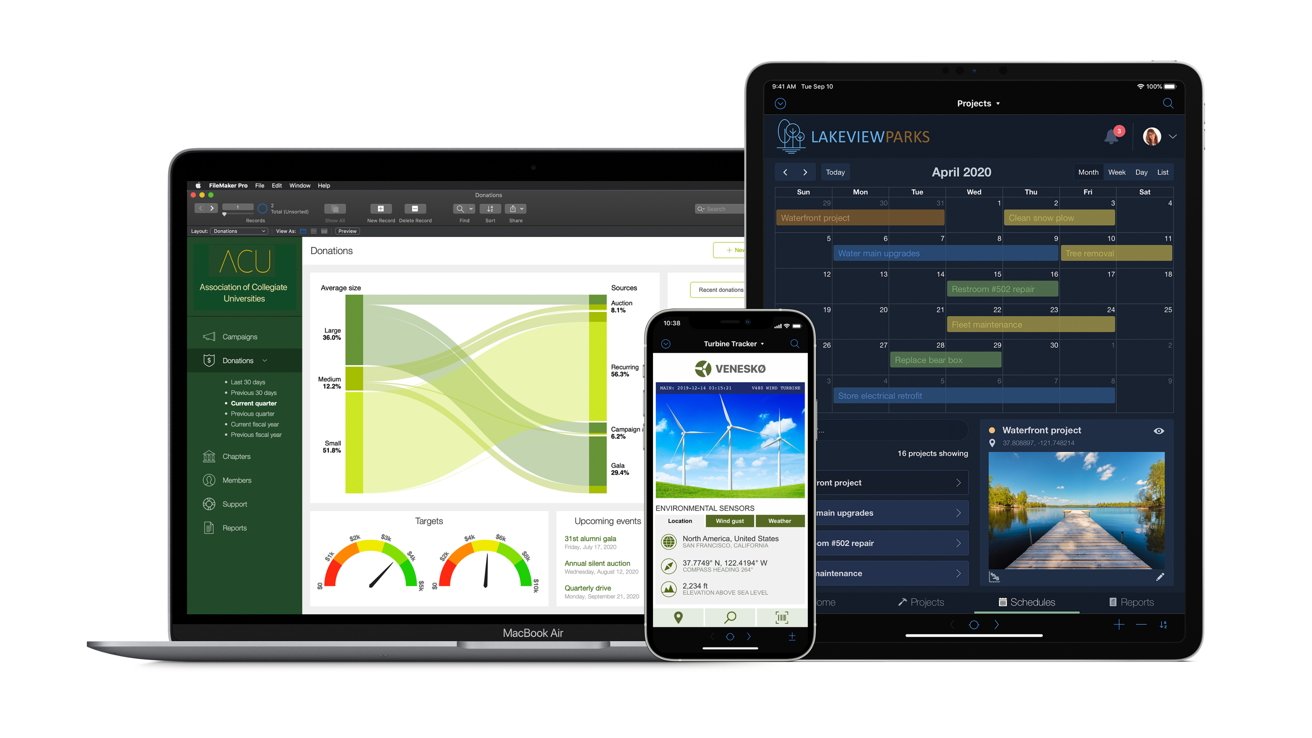The custom database and app-building platform FileMaker by Claris has been updated with full macOS Ventura compatibility.
Claris FileMaker Pro and FileMaker Server have been updated to version 19.6.1 with a host of improvements, including macOS Ventura compatibility. The app also now supports the Sign in with Apple authentication option.
FileMaker Pro is an app that lets businesses create custom app solutions. It has a drag-and-drop style interface that can quickly get an app made from scratch.
The FileMaker Server is a product that hosts FileMaker Pro apps within an on-premise server for team access. This enables integration with existing systems at the company with 24/7 access.
Interested users can get Claris FileMaker Essentials plan for $21 per user, per month with the ability to create 3 apps among 10 users. The Standard plan enables up to 99 users to create and host 125 apps for $43 per user per month.
 Wesley Hilliard
Wesley Hilliard








 Marko Zivkovic
Marko Zivkovic

 Christine McKee
Christine McKee


 Malcolm Owen
Malcolm Owen
 William Gallagher
William Gallagher
 Andrew O'Hara
Andrew O'Hara







4 Comments
I thought it was free for personal use?
The freemium version hasn't been released yet. Apparently it will be free for personal, local files and then paid for hosted files.
It's a bit more complicated than that.
Right now, Claris have essentially forked the codebase for the "Claris FileMaker Platform" and the "Claris Platform" - what I've been hearing is that Claris, Inc. has been dealing with widespread piracy for so long that they finally have had enough. A few years ago, they introduced the concept of the "Claris ID" and now, with the "Claris Platform", that Claris ID must be used to sign into the application.
Knowing that this step would be untenable for a significant portion of their customers, Claris is continuing to develop, sell and support the existing "Claris FileMaker Platform" that does not have such a requirement. For customers with on-premise deployments and, more importantly, custom authentication management (such as Active Directory), the Claris ID is never going to fly. It's hard enough to keep AD up-to-date, let alone some third party's user database, and employee information is sensitive - some jurisdictions have legislation that requires something as simple as "does this person work for this company?" to be kept confidential.
The new versions of FileMaker are a welcome confirmation that Claris is continuing to support existing customers. But the "Claris FileMaker Platform" is now legacy software and at some point in the future it will be dropped (I'm guessing somewhere around 2030 given the complexities involved).
The "Claris Platform" is priced higher than the "Claris FileMaker Platform" and includes access to the applications of the "Claris FileMaker Platform" (FileMaker Pro, FileMaker Server and the free FileMaker Go app for iOS). But you also get Claris Pro, Claris Server, Claris Go (currently US-only), Claris Connect (a web-based tool for interacting much more easily with Web APIs, although only a limited set of APIs are supported) and Claris Studio (a web-based tool for providing anonymous access to data over the web, highly scalable but with an extremely limited feature set right now).
Claris still have not worked out a solid roadmap for the "Claris Platform" products. They've got solid principles in place and plenty of ideas they're trying to flesh out, but in my opinion they released this stuff well before it was ready for prime time. Claris Server is only available on Linux (FileMaker Server is available for macOS, Windows Server and Linux). Claris Studio is being developed at a tremendous pace, but the bug database is growing just as fast and the integration with Claris Pro is not as seamless as it should be: "bleeding edge" is the appropriate term. The developer community is taking a largely positive attitude and providing a lot of the stress-testing, but there are also a lot of noses out of joint.
The current expectation is that Claris will announce the details of the "freemium" version of the "Claris Platform" (and only the "Claris Platform") in late January of 2023 - maybe early February, we'll see how things pan out. The "free" tier is expected to make all the development and testing features available but to block the sharing features: the thinking behind it is trying to make learning the product free but using the product the point where the company makes money.
For the past decade the management team at Claris (and, clearly, at Apple) have been looking at the valuations afforded to various competitors in the "low-code/no-code" space that have web-only access, and there's a fair amount of motivation to gain similar market share, notoriety and revenue. The problem is that this approach is at odds with the approach that has given the company its current success: OS-native software that provided a better interface than HTML5 could deliver, guaranteed information sovereignty because of on-premise installation, and simplicity that had a very low performance penalty (the learning curve is gentle). The historic approach is not without its problems: lack of integration with modern software development tools and approaches, negative perceptions in the minds of "traditional" IT people (leading to a lack of exposure to new computer users), lack of scalability to the levels now expected in the Internet age.
FileMaker has strengths that are not offered by any other product or service on the market. Bar none. It is much more capable than AirTable or similar products in terms of what you can build, but scalability and web accessibility need substantial improvement to compete in the present environment. Claris have decided to use a different tech stack to build a separate product to solve those problems which is unusual but not necessarily a bad thing. As long as they implement it well and gain some mindshare I think they've got at least another 30 years of success ahead of them.